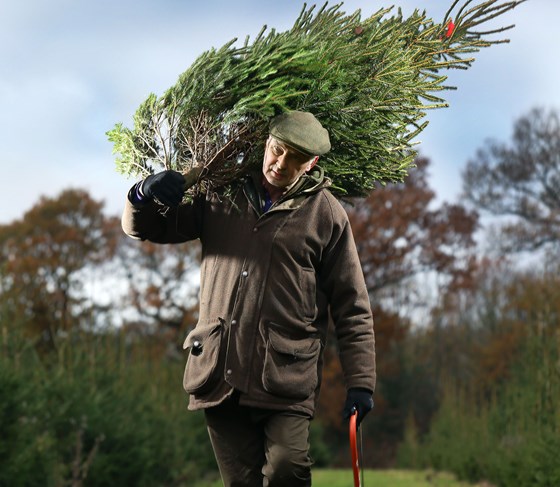News from the Field - January 2018
By the time you read this, we’ll have swept up most of the pine needles and the Christmas tree season will be firmly behind us.

Thanks, as always, for your continued support of local businesses such as ours and to the Rivers Meet Café who provided welcome refreshments for our customers at the weekends. We also raised over £260 for the ‘Give A Duck’ charity from the donations bucket on board our tractor and trailer rides. On a personal note, I’d like to thank the local community for all the kind words and support that they have given me and my family over the past few weeks, since my father passed away. We were delighted to hand over more than £1000 of donations in total to our chosen charities – Macmillan and the Prince of Wales Hospice, both of which did so much to help my father and us in the last few months.
As we turn to 2018, we will once agan be planting saplings to replenish the Christmas tree plantation; 30 – 40 for every one we have cut down. We’ll also turn our attention to the hedgerows and ensure that everything that needs trimming is scheduled before our deadline of 28th February. As farmers, we are not allowed to cut hedges between 1st March and 31st August, which allows birds to nest undisturbed - it’s an important rule and one that we follow carefully.
The problem of poaching never seems to go away – despite investing in gates and padlocks to try and deter the culprits, they are now cutting the chains and padlocks to access the fields. It’s an area of rural crime that is often overlooked but is very frustrating, especially when they drive their vehicles all over a freshly established crop which is just starting to emerge. Please do report any information to the local police.
Looking further ahead into the year, the farming community waits with baited breath to see what affect Brexit will have on future funding for farmers. While we would all prefer to operate in an industry that wasn’t supported by subsidies, the issue is that as long as the rest of Europe’s farmers are receiving subsidies from their governments, we need to receive a similar level of support in order to produce goods at a price that is competitive with our EU neighbours. That said, we really do have some of the highest food standards and animal welfare standards in the world, so don’t be shy in buying British, and remember that, as with anything, you really do get what you pay for!
Wishing you all a happy, healthy 2018.